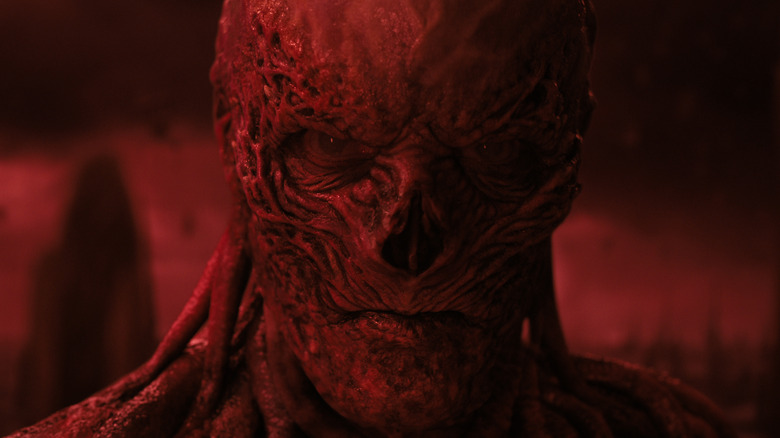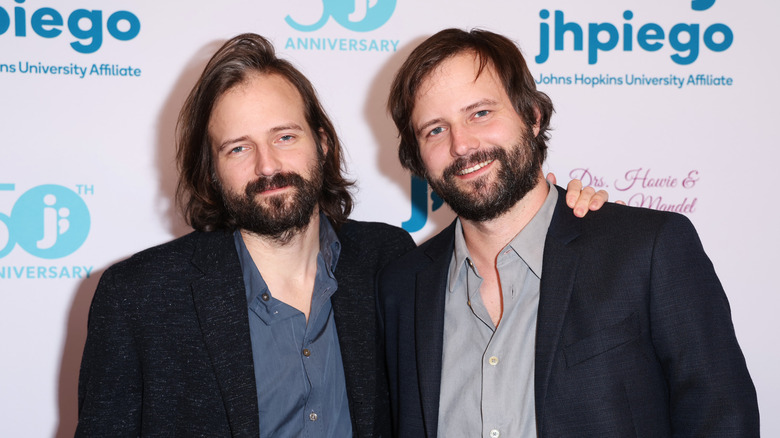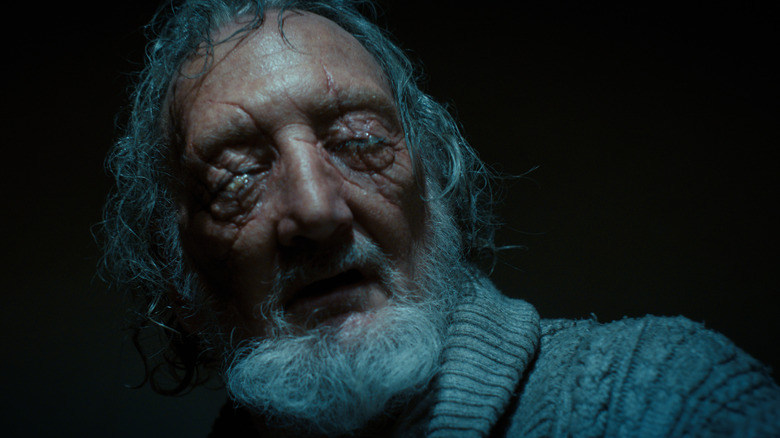The Childhood Fears Of Stranger Things' Duffer Brothers Make A Lot Of Sense
"Stranger Things" is, obviously, about strange things. But more specifically, it is about the strange things that exist underneath the seemingly ordinary. This is a tried and true trope for horror and science fiction. The middle-American small town that unexpectedly hosts a deep, dark secret or eldritch monster beneath its idyllic surface is a story with endless possibilities and permutations.
The '70s and '80s were definitely a heyday for this subgenre. So many of that era's anxieties around suburban life –- from the pitfalls of conformity to the amorphous fear of "outsiders" –- provided fertile ground for the decade's horror fare. Films as varied as "Poltergeist" and "Halloween" reflect as much. As VHS Revival's Edison Smith argues, the terror of "Halloween" came from the uncertainty over the origin of Haddonfield's shattered sense of security and the sense that no matter how hard one tries to escape into suburban safety, the danger will always find them.
So it's no real surprise that the Duffer Brothers –- Matt and Ross, the creators of the smash hit sci-fi-horror series that has shaped streaming history and made careers for its young cast -– were so influenced by this particular oeuvre of horror. The twin brother writer-producers are just old enough to have caught a great many of the decade's classics on television. How they shaped the two is rather clear.
Pennywise, Pinhead, and Freddy
Speaking with the New York Times in 2016, Matt and Ross Duffer were asked by interviewer Finn Cohen what scared them as kids. "We have a particular problem with clowns," replied Matt, citing the 1990 miniseries adaptation of Stephen King's "It." Despite the series not being all that good, in Matt's opinion, it clearly stuck with both him and Ross.
Ross also added "Evil Dead" into the mix, though added that when they first watched it at around the age of ten, they didn't really get how funny the concept was. Both agreed that their being a tad too young is what allowed other films –- particularly "Hellraiser" and "A Nightmare on Elm Street" –- to have such a large impact on them.
"Now that I'm thinking about it, both 'It' and 'Hellraiser' are also about interdimensional beings," said Matt, implying the similarity between those films' antagonists and the creatures of the Upside Down. "Maybe we're just terrified of interdimensional beings, particularly if they can turn themselves into clowns."
Granted, neither Vecna nor the Mind Flayer nor any other villains of "Stranger Things" have yet to turn into clowns, which may be for the best. But then, not all of the citizens of Hawkins, Indiana, need to don grease paint to be swayed into terrifying actions.
The monstrous and the mundane
The Duffer Brothers seemed to be most explicit, however, in the affinities between their own project and 1984's "A Nightmare on Elm Street." This was, alongside "Halloween," one of the first films to drop the slasher into the suburbs. "But what we were trying to do with 'Stranger Things' is, it's again, very ordinary," explained Ross, "like 'Nightmare on Elm Street' is very ordinary: teens, people that you understand and can relate to, and then this evil that you can't even fully explain."
Season 4 of "Stranger Things" famously cast Robert Englund -– Freddy himself -– in the small role of Victor Creel, the everyday resident of Hawkins who brutally killed his own family after being driven mad by the Upside Down. This juxtaposition between the monstrous and the mundane is what allows the plot to be compelling and relatable in "Stranger Things."
Others have seen that the connections between "Stranger Things" and Wes Craven's most iconic creation run far deeper than the casting, or the passing scorched resemblance between Freddy and Vecna (Jamie Campbell Bower). "Sure, the kids on bikes and wondrous and horrible things descending on a small American town owe a lot to the Steven Spielberg corner of '80s pop culture," wrote GQ's Keith Phipps, "but the idea that there's something fundamentally evil beneath the surface of Hawkins' suburbia? That owes as much to Craven as 'Poltergeist.'"


